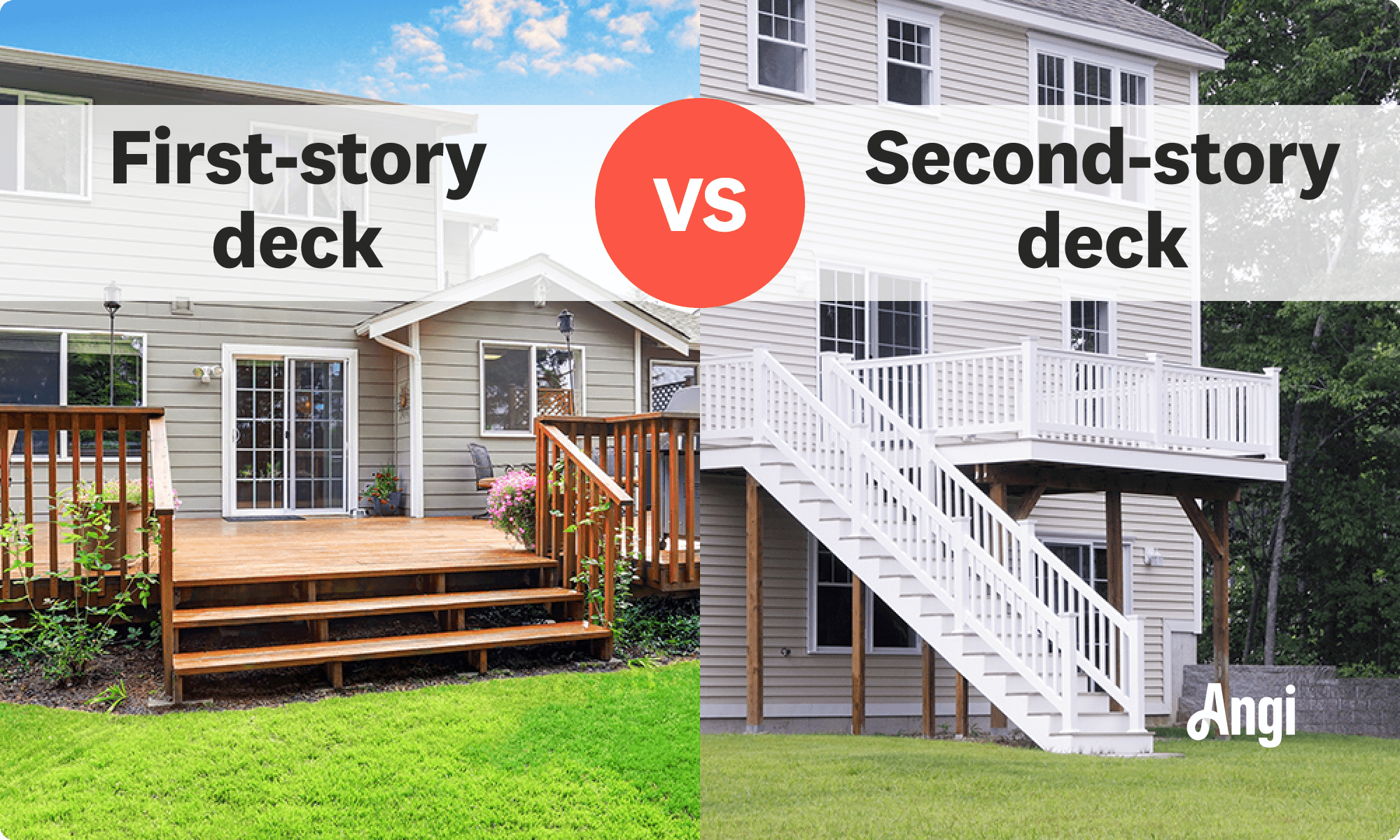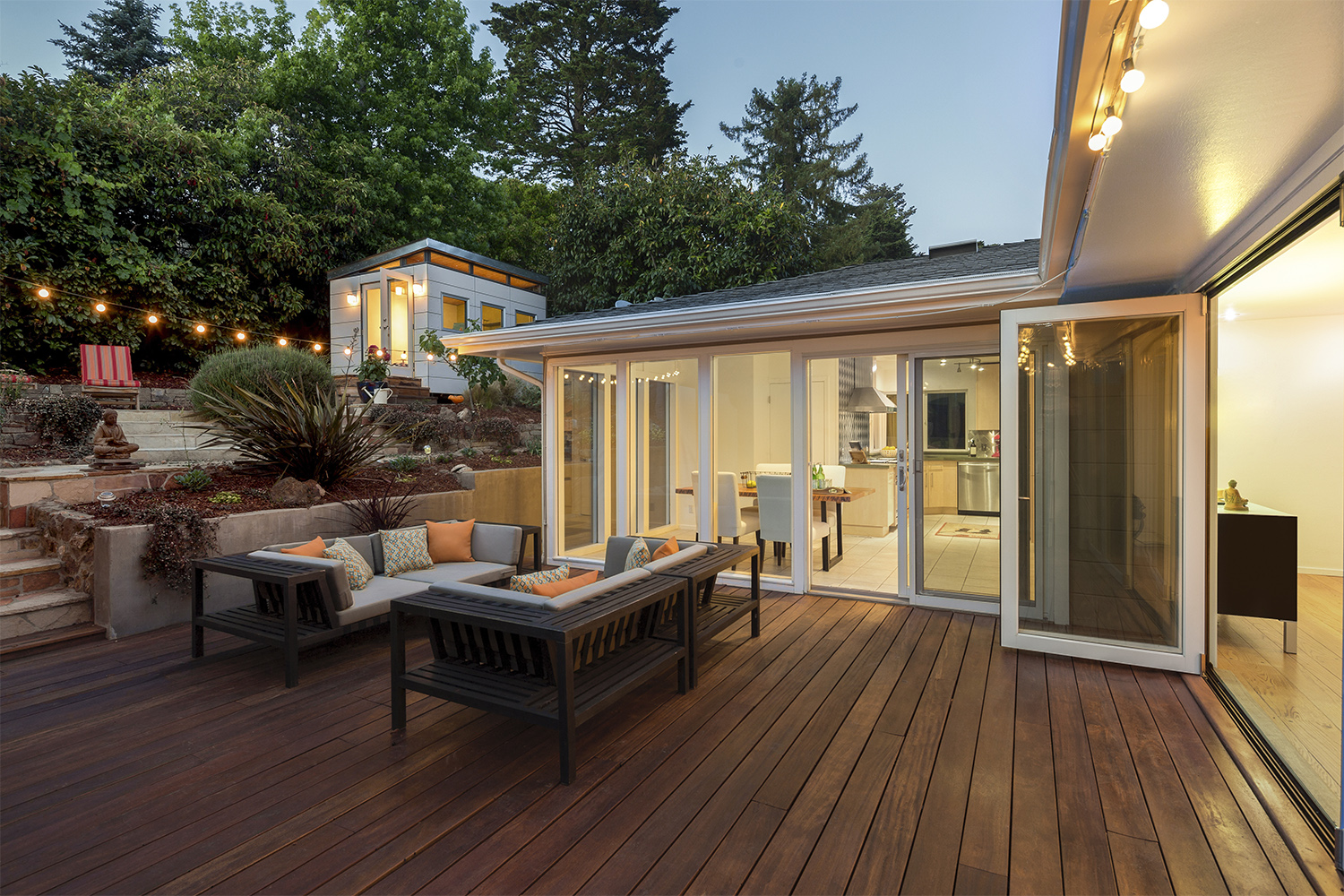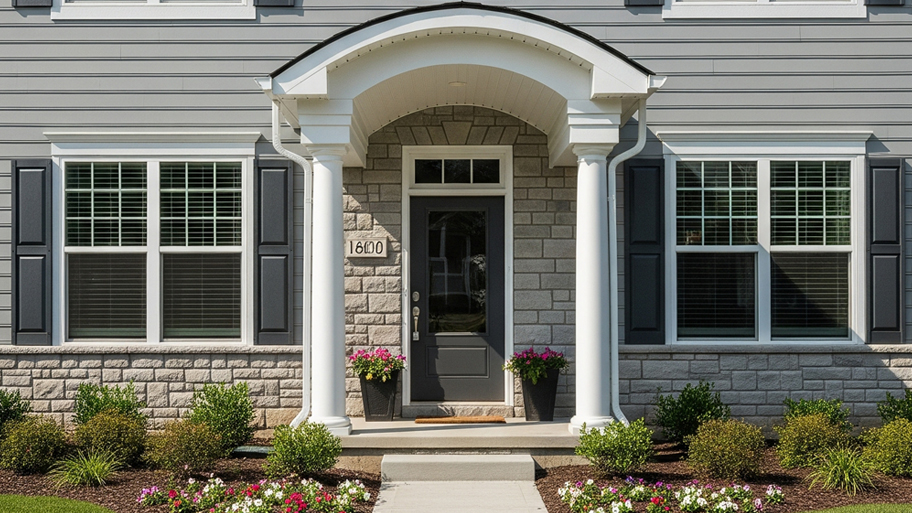Deck repair costs depend on materials, damage you need to fix, and more. See how much it costs to replace or repair a deck in Columbus, OH.
How Much Does It Cost to Build a Deck in Columbus? [2026 Data]
Deck and porch service costs depend on your project and location. Check with a local pro for your specific job.
Most new decks cost $25 to $49 per square foot, depending on size, height, and extras.
Pressure-treated wood costs $2 to $4 per square foot, keeping initial costs low.
Ipe wood costs $8 to $16 per square foot, but it can handle snow, sleet, and whatever else Ohio throws at it.
Add-ons can sneak up on your budget, such as a retractable awning, which costs $492 to $2,870 for extra shade.
A deck delivers up to an 83% ROI, adding $3,620 to $10,450 in value.
In a city where Buckeye pride is part of the local DNA and cookouts are practically a sport, a deck is the ultimate gathering spot. Building a deck in Columbus, OH costs $6,762 on average, with most projects costing between $3,784 and $9,888. In true Arch City fashion, your future retreat should handle everything from warm sunsets to snow days. Costs climb for multi-level layouts, premium materials, and inviting extras that stand up to Ohio’s humid summers and icy winters.
Deck Building Cost Factors

Columbus might be flat, but deck building here is anything but simple. The soil around the Olentangy and Scioto rivers tends to shift after heavy rain, so a sturdy foundation is crucial to preventing your deck from becoming a tilted, funhouse floor.
Builders often add extra footings or moisture barriers to handle the city’s soggy springs and freeze-thaw winters, minor upgrades that quietly raise costs. Multi-level decks are popular for split-level homes in Clintonville or Worthington. They offer great views and extra space, but require more framing, railings, and labor to execute effectively.
The local climate keeps everyone guessing, so durable materials like composites or exotic hardwoods are great investments that can withstand both July heat and January frost. Extras like built-in benches, lighting, or a fire feature can turn your deck into a year-round retreat, perfect for hosting friends and skipping the crowds at BrewDog.
Size
Most new decks cost $25 to $49 per square foot. The higher end of that range represents deck projects built on second stories, building a deck with high-end wood, or customized designs. See the table below for general estimates based on the size of your deck:
| Deck Size in Feet | Average Cost in Columbus, OH |
|---|---|
| 10x10 | $3,280–$4,920 |
| 10x12 | $2,952–$5,904 |
| 12x12 | $4,723–$7,085 |
| 12x16 | $4,428–$8,856 |
| 12x20 | $7,872–$11,808 |
| 14x20 | $9,184–$13,776 |
| 12x24 | $9,446–$14,170 |
| 16x20 | $10,496–$15,744 |
| 20x20 | $13,120–$19,680 |
Material
Your chosen deck material will make up a large portion of your total budget, ranging from $2 to $37 per square foot. Less-expensive materials can be tempting, but they may result in extra expenses for maintenance and repair, which you’ll need to hire a local deck contractor to handle.
Here’s a breakdown of the materials and their costs:
Pressure-treated wood costs $2 to $4 per square foot
Composite deck materials cost $10 to $18 per square foot
Ipe wood decking costs $8 to $16 per square foot
Tigerwood costs about $6 to $12 per square foot
Mahogany costs $7 to $9 per square foot
Redwood decking costs $4 to $29 per square foot
Bamboo decking costs $2 to $8 per square foot
Cedar decking costs $2 to $6 per square foot
Metal or aluminum decking costs $12 to $16 per square foot
| Decking Material | Pros in Columbus, OH | Cons in Columbus, OH |
|---|---|---|
| Pressure-treated wood | Budget-friendly choice | Warps in humid summers |
| Composite decking | Handles freeze-thaw cycles | Can fade over time |
| Ipe wood | Handles icy conditions | Expensive to install |
| Tigerwood | Durable in wet weather | Color fades |
| Mahogany | Stable in temp swings | Needs regular sealing |
| Redwood | Naturally rot-resistant | Soft; dents easily |
| Bamboo | Eco-friendly option | Swells in moisture |
| Cedar | Resists rot; pleasing aroma | Warps in damp air |
| Aluminum/metal | Won’t rot or mold | Smooth surfaces get slick when wet |
Deck Type
Simply put, the more complex your deck build is, the more it will cost. Types of decks like wraparound, multi-tier, and rooftop decks require greater accessibility, additional prep work, and often more materials.
For example, if you want to build a floating deck, it will likely cost about $16 to $49 per square foot. These decks don’t actually float—they’re just not attached to your home. Because of this, they’ll need a few more support posts to keep them structurally sound.
Deck Height

The type of deck you build will likely go hand in hand with where it’s installed. A second-story deck (which some contractors might deem a balcony) costs more to build because it’s harder to install. The most common place to install a deck, which is also likely the most cost-effective, is on the first floor attached to the backside of your home.
Here’s one example of how the cost average might differ:
10x10 first-story deck: $820–$1,640
10x10 second-story deck: $3,280–$4,100
Framing
Framing a deck, which ensures the unit's joints are structurally safe and sound, costs $7 to $10 per square foot for labor. The lumber or materials needed to frame your deck account for about one-third of the lumber you’ll need.
Flooring
Some homeowners choose to install flooring over a wood deck. Composite is a good material option, while more elegant choices like porcelain or ceramic could add thousands (or tens of thousands, depending on the deck’s size) to your price tag. The average cost ranges from $16 to $37 per square foot, depending on the material.
Add-Ons
Here are some other costs you might incur if you upgrade from a simple deck build:
Staircase cost: $20–$41 per stair
Electricity cost: $107–$246 per outdoor outlet
Outdoor lighting fixtures cost: $41–$410
Heaters cost: $82–$246
Outdoor misting system cost: $1,722–$2,788
Sofa, chairs, and table cost: $410+
Outdoor fireplace cost: $1,230–$6,560
Retractable deck awning cost: $492–$2,870
Deck Pro Costs
In the 614, a deck build is part craftsmanship, part red tape, and part weather roulette, because no one does “sun, rain, and frost in one day” quite like Columbus. Between navigating city permits, keeping crews on schedule, and budgeting for everything from planks to tipping, there’s more to the final cost of hiring a Columbus deck builder than just labor and materials.
Local Labor Rates
The cost of living in Columbus is 5% lower than the national average, which helps keep deck labor rates down. That said, you still get what you pay for. Skilled builders with experience working through Ohio’s unpredictable freeze-thaw cycles know how to pour footings that won’t heave come February. You can also expect seasoned pros to charge a fair price for that experience, especially during the busy spring and summer months.
Permits
You will need a building permit if your new deck attaches to your home, is built on permanent footings, or is more than 30 inches off the ground. The City of Columbus Department of Building & Zoning Services bases permit fees on your project’s size and value, anywhere from a couple of hundred bucks for smaller decks to much more for large or complex builds. Your contractor will handle this part, filing plans and scheduling inspections as needed.
Licensing and Certification
Who you hire to build a deck matters. Columbus doesn’t let just anyone swing a hammer for hire. Contractors need a local license to pull permits, and larger projects might also require a State Master License from the Ohio Construction Industry Licensing Board (OCILB). It all helps to weed out the fly-by-night types who vanish faster than a food truck on High Street after lunch rush.
Sales Tax on Materials
The sales tax rate in Columbus is 8%, but homeowners don't pay it directly. In Ohio, deck contractors are considered the end-users of materials, meaning they pay sales tax when buying lumber, fasteners, and hardware, then roll those costs into your overall project estimate. So while you will not see sales tax listed on your invoice, you still pay it indirectly. And FYI, labor is not taxable.
Tipping
Tipping your deck crew is not required, but it is a great way to thank them when a job finishes up early, when they power through brutal weather, or if they gave you a break on the cost of staining. Cash tips of $20 to $50 for each worker can go a long way in covering their expenses and showing your appreciation.
Professional installation ensures that the deck is built to code, minimizing the risk of costly repairs or replacements due to structural issues, improper materials, or faulty construction techniques. Moreover, pros have access to industry discounts on materials and tools, which can reduce up front costs.
Does Building a Deck Increase Home Value?
For Cbus residents, adding a deck is a quality-of-life upgrade with serious payoff. With an average ROI of 83%, most homeowners see an extra $3,620 to $10,450 in resale value when they sell. But the real return shows up long before listing day.
A solid deck improves safety by eliminating wobbly rails and uneven steps, boosts efficiency with materials built to handle the area's unpredictable weather, and adds functionality for backyard BBQs, quiet mornings, or Buckeye watch parties. Add a few universal design touches, like wider stairs or smooth transitions, and everyone can enjoy the space comfortably.
How Angi Gets Its Cost Data
Home is the most important place on earth, which is why Angi has helped more than 150 million homeowners transform their houses into homes they adore. To help homeowners with their next project, Angi provides readers with the most accurate cost data and upholds strict editorial standards. We survey real Angi customers about their project costs to develop the pricing data you see, so you can make the best decisions for you and your home. We pair this data with research from reputable sources, including the U.S. Bureau of Labor Statistics, academic journals, market studies, and interviews with industry experts—all to ensure our prices reflect real-world projects.
Want to help us improve our cost data? Send us a recent project quote to [email protected]. Quotes and personal information will not be shared publicly.
The homeowners guide to deck and porch services
From average costs to expert advice, get all the answers you need to get your job done.

Trellises are structural pieces that add to your garden, but they can also add to your bills. Keep reading to find out how much a trellis costs to build.

Are your porch columns old or simply unsightly? It might be time to refresh them. Here's a breakdown of the cost of replacing porch columns.
 •
•Discover the cost of bamboo decking. Learn about installation prices, key cost factors, and ways to save on your bamboo deck project.

Are you wondering if a porch or deck is better for your home? Compare the pros and cons of these two outdoor favorites to help you find your best fit.

A portico is a small, porch-like structure that adorns and protects a home’s front entrance. Learn what makes a portico and the benefits of building one.


